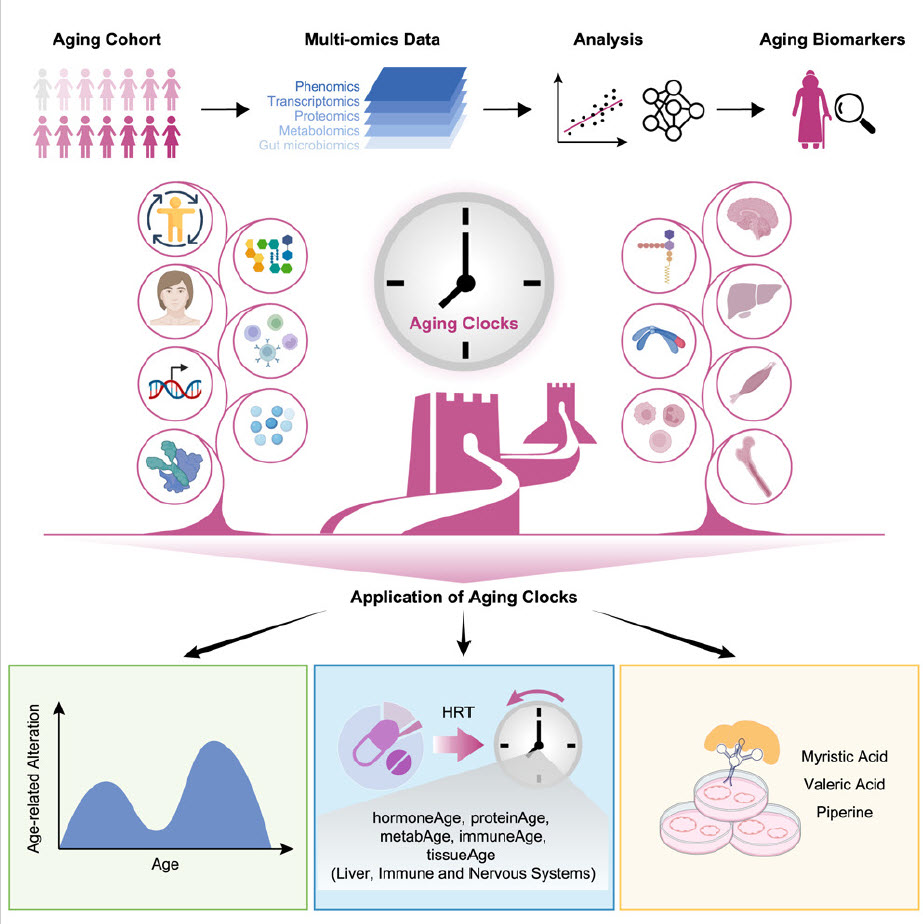Elsevier,
The Lancet Regional Health - Europe, Volume 34, November 2023
The study unveils a significant occurrence of sexual violence among recently arrived asylum-seeking women in France, especially notable among those who had previously experienced sexual violence. It underscores the heightened risk linked to the absence of support for accommodation.
Elsevier,
The Lancet Child and Adolescent Health, Volume 7, November 2023
Stella Chan's interest in psychology began when she went through a tough time as a teenager. The experience gave her a sense of direction: “I wanted to learn more about psychology and how feelings work...I hoped I could do something constructive about mental health.”
Elsevier,
Med, Volume 4, 10 November 2023
This study identifies a set of markers associated with aging in women, and uses them to create an "aging clock" that can measure a person's biological age. The clock reveals distinct aging patterns and suggests that hormone replacement therapy can slow down some aspects of aging.
Elsevier, Research Policy, Volume 52, November 2023
Knowledge of biological diversity is a major source of innovation. Collective intellectual property of traditional knowledge by Indigenous peoples and local communities is an important source of innovation and product development. This article investigates collective intellectual property systems on the traditional knowledge of Aspalathus linearis, also known as rooibos—an endemic plant from South Africa which is the basis of an important herbal tea industry. The article discusses how collective action and self-organization can generate collective intellectual property systems; indigenous peoples and local communities can develop these systems to protect their IP; how these systems can promote social justice and a more equitable distribution of benefits but can be sources of dispute between socio-economic groups and communities and can reproduce historical inequalities and power asymmetries.
Elsevier, eClinicalMedicine, Volume 65, November 2023
Background: Gender-based disparities in health-care are common and can affect access to care. We aimed to investigate the impact of gender and socio-environmental indicators on health-care access in oncology in France. Methods: Using the national health insurance system database in France, we identified patients (aged ≥18 years) who were diagnosed with solid invasive cancers between the 1st of January 2018 and the 31st of December 2019.
Elsevier,
The Lancet Rheumatology, Volume 5, November 2023
This Article supports SDG 3 by estimating burdens of other musculoskeletal disorders (conditions other than osteoarthritis, rheumatoid arthritis, gout, low back pain, and neck pain), which are a source of a large amount of disability globally; they are the sixth leading cause of years lived with disability globally, and the authors note they are an important consideration for policies regarding musculoskeletal health.
Elsevier,
One Earth, Volume 6, 17 November 2023
The paper addresses the urgent need to halt species extinction by proposing a global prioritization strategy for conservation, leveraging individual population data to identify priority areas that significantly enhance the long-term persistence of threatened terrestrial mammal species, thus providing a more effective and efficient approach for meeting the targets outlined in the Global Biodiversity Framework.
Elsevier,
Acta Biomaterialia, Volume 171, November 2023
This article aligns with Sustainable Development Goal 11: Sustainable Cities and Communities. The research focuses on transitioning the construction industry towards sustainable practices by utilizing local biological materials and developing a construction method for tension-compression anticlastic shellular structures. The use of a fully biodegradable material system and an earthen construction workflow helps minimize the environmental footprint in the built environment.
This article aligns with Sustainable Development Goal 3: Good Health and Well-being. The use of polymer-functionalized plant leaf scaffolds as a novel human cell culture platform for tissue engineering applications, specifically for promoting the alignment and elongation of muscle cells, contributes to advancements in healthcare and the development of functional skeletal muscle tissue.
Elsevier,
One Earth, Volume 6, 17 November 2023
The paper underscores the urgency of addressing climate change's impact on biodiversity through transboundary conservation efforts, offering guidelines for designing climate-smart marine protected area (MPA) networks in regions like the California Bight, highlighting the need for international coordination to ensure effective protection and adaptation strategies for vulnerable species and ecosystems.
Elsevier,
Current Developments in Nutrition, Volume 7, November 2023
This paper concludes that it is imperative to identify effective, early treatments for Alzheimer's disease. Creatine is an important bioenergetic molecule, and the Creatine system is shown to be dysfunctional in the brain of individuals with Alzheimer's disease. Therefore, Ceatine may serve as a potential target for prevention and therapy and creatine monohydrate supplementation may be beneficial in Alzheimer's disease. To date, only rodent studies have investigated the use of creatine monohydrate as a treatment for Alzheimer's disease.. Thus, clinical trials investigating the effects of creatine monohydrateon cognition and creatine monohydrate’s mechanisms in humans with Alzheimer's disease as well as its potential as a strategy to prevent cognitive decline in those with normal cognition, are needed. There is much to be learned about CrM intervention and brain health in different life and disease phases.


